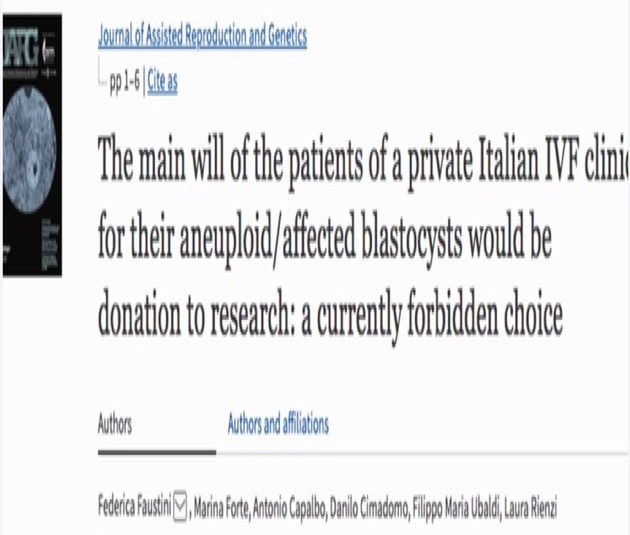
The main will of the patients of a private Italian IVF clinic for their aneuploid/affected blastocysts would be donation to research: a currently forbidden choice
Federica Faustini, Marina Forte, Antonio Capalbo, Danilo Cimadomo, Filippo Maria Ubaldi, Laura Rienzi
J Assist Reprod Genet. 2019 May 27. doi: 10.1007/s10815-019-01465-2. [Epub ahead of print]
Abstract
PURPOSE: Surplus cryopreserved affected/aneuploid blastocysts may be obtained after in vitro fertilization (IVF) treatments with preimplantation genetic testing (PGT). These embryos are considered not suitable for transfer and may be discarded. Currently, in Italy, an embryo disposition decision (EDD) is not allowed and the frozen/vitrified blastocysts (even if affected/aneuploid) should be kept cryopreserved indefinitely. In this peculiar clinical, social, and legislative scenario, we aimed at assessing the attitudes of the patients towards the fate of these embryos, in case the local regulation would be changed and allow an EDD regarding the surplus affected/aneuploid embryos obtained after PGT.
METHODS: A questionnaire with multiple answers was submitted to 832 patients who obtained affected/aneuploid embryos during a PGT cycle at our private IVF center. They were asked to choose between three putative options with related reasons: everlasting cryopreservation (only option currently available); discard or donate them to research.
RESULTS: Overall, 149 patients (18%; 85 women and 64 men) answered the questionnaire. Among them, 84% (n = 126) would choose to donate their affected/aneuploid blastocysts to research, 9% (n = 13) would discard them and only 7% (n = 10) would keep them cryopreserved indefinitely.
CONCLUSIONS: Donation of the affected/aneuploid blastocysts is the option chosen from most of the respondents (84%; 15% of the eligible patients). These patients are motivated from the altruistic will of incentivating the progress in IVF and/or stem cell research and supporting future couples to limit/solve their infertility/health issues.
KEYWORDS: Affected embryos; Donation; Embryo disposition decision; Preimplantation genetic testing; Surplus embryos